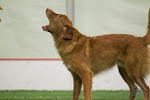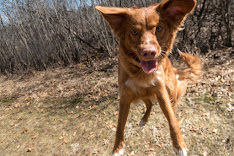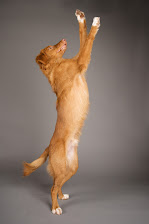Perfection in Training
I'm on a few obedience and agility groups/lists and I often see the phrase, "But he's perfect in training!" Usually a lament about an issue that is regularly cropping up in trials but they are not seeing in practice.
My own dogs are never perfect in training. If I ever had a perfect training session I would have to question my ability to raise criteria and my creativity in challenging myself or my dog. Lance is capable of getting a perfect score on his heeling in trials (something I never thought I would say even a year ago!), but in practice I'm doing tons of little moves to challenge him and to be able to tell him "gotcha!" when he fails. And because he is an advanced dog, I'm also doing some boring traditional heeling patterns so that there is not a striking difference between what could become trials=boring and practice=constant engaging movement.
There certainly are issues that the perfect in training statement can hold true. I have had to work very hard and be creative to even try to replicate some of the issue that Lance has had in obedience trials. But often an issue that you're not seeing in practice can boil down to a few common reasons:
1. Stress,confidence, or anxiety issues.
2. Motivation issues
3. Foundation/generalization/arousal issues.
Stress
Dogs who stress down are pretty obvious to identify. They might do everything slower than usual, do intense sniffing, fail to do something on the first command, or go around jumps. Dogs who stress up in trials can be harder to identify as at first glance they might just look really happy. But they're not. Dogs who stress up might be frantic in their motions and in general they're brain is not in any condition to think. I lump anxiety issues and confidence issues into this same category of problems as stress. In all cases, the dog likely knows what to do but just can't. These problems have many possible solutions but none are a quick fix. The possible exception to the quick fix is for a very green dog with a stable and confident personality who manages to figure out and adjust to the stress of the ring despite a handler not knowing how to train and prepare the dog for it. A potential help for dogs is Ring Confidence work to slowly and positively introduce the dog to all the stressors he will encounter at a trial.
 Motivation
Motivation
Usually motivation issues are more of a problem in obedience where the work is less naturally reinforcing than in agility where the runs are short and fast paced. Unless of course the dog is Vito. If you think your dog's trial issues are due to lack of motivation than honestly ask yourself how you are rewarding your dog in practice.
Is the reward physically on your body? Do you reward every single good repetition or every single set up? Do you need to get your dog excited with your food/toys before the dog will engage with you? Is the dog used to and comfortable with long stretches of silence and formality? Are you able to reward the dog with just you (no external reward)?
I know I've failed on all of those above points in the past and I still need to honestly ask myself those questions on a regular basis. If one of those points is glaring at you then it's very likely that your dog notices the difference too. A simple test you can do is go a place your dog has never been before with plenty of distractions. Get your dog out of the car and make sure you have no rewards on your body or even visible ones. Stand still and wait. How long does it take your dog to check in with you without you have to say or do anything? On a single quiet cue that you are available for work to start, does your dog immediately give you that perfect picture of engagement and precision you want? Are you able to do a run through and keep that engagement and effort?
Foundation
For dogs without stress and motivation issues the issue may lie in the dog not fully understanding all the criteria. This is where proofing can come in to try and see exactly what part of the exercise the dog has a problem with. Besides duration, distance, and distractions as the most common ways to look at a behavior, also consider latency and speed.
I put arousal issues in with foundation and generalization because a solution can often be found in one of the above areas. If your dog is as high as a kite in trials (and isn't really stressed) then I personally would recommend trying to replicate high arousal in practice as often as possible vs trying to calm the dog down (and separately work on high followed by a controlled behavior). If you're able to replicate it then it will likely allow you to systematically work through the issue. Try hooping and hollering as your dog runs down the dogwalk. Several drop on recalls in a row to work on anticipation of the down. Waiting a very long time before giving a signal or flashing them at the speed of light. Falling to the floor (gracefully!) as the dog takes a jump. You may need to think outside the box to try and "break" your dog. I prefer to tackle issues head on rather than avoid them. That being said, I see proofing the issues as opportunities to build confidence rather than tear the dog down. I laugh and tell my dogs that I fooled them on the mistakes and simply reset to try again.
 |
| The too cute for criteria stage of 2012! |






When I saw your post title I thought, "HA I WISH we were perfect in practice!" But then thankfully I saw I'm not alone :)
We've been going to (and will continue to go to) obedience classes again. I'm pleasantly surprised with how much she remembered. Yes, obviously things need polishing. But she maintained a lot. Our biggest hurdle will be keeping her fat mouth shut. She doesn't howl when she's working. She's obnoxious before agility, but doesn't make a peep on course. Same for obedience - she's quiet during all exercises, but as we're setting up or whatever she howls. Impatient to get going again. I'm working on a "hush" command but might have to treat it as one loooong exercise rather than releasing her. Or at least making her do something constantly. As other dogs are recalling, lots of sits/downs/whatever's. I dunno...
Either way, lots to practice :)
Glad you're working on obedience again!!! I love sassy dogs :) I think you'll be able to fix that pretty easily though if it's just at setups and not during the exercises. but waiting around while other dogs are working and she isn't is completely different than the anticipation she will feel at setups while she is still working. I do quite a bit of play-play-play quick setup in heel and wait for several long seconds before playing again.